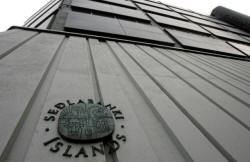|
In surprise move, Iceland
cuts interest to tame its currency
 Send a link to a friend
Send a link to a friend
 [August 24, 2016]
By Ole Mikkelsen [August 24, 2016]
By Ole Mikkelsen
(Reuters) - Iceland's central bank on
Wednesday cut its key deposit interest rate by 50 basis points to
5.25 percent because monetary policy earlier this year has been more
successful than expected, the central bank said.
The surprise move comes amid optimism over the country's inflation
target and could signal both a normalization of the economy and
concern over capital inflows strengthening the currency.
"It appears that it will be possible to keep inflation at target
over the medium term with a lower interest rate than was previously
considered necessary," the central bank said in a statement.
Ahead of the monetary meeting analysts at Islandsbanki expected
unchanged interest rates..
"I think the concern about outflow of money has now been replaced
about a concern for a strong inflow," Markets and Money Advisory
economist Lars Christensen said.

The Icelandic crown <ISK=> has strengthened by more than 8 percent
over the last five to six months.
"Today's news indicates that the Icelandic economy is on track to be
normalized," Chief Analysts Jakob Christensen from Danske Bank said.
The strong Icelandic crown has increasingly attracted investors from
abroad but created challenges for exporters in Iceland.
It is the first time since November 2014 that the Icelandic central
bank has cut the key deposit rate, which is now at its lowest level
since August last year.
Last week Iceland's government proposed major steps aiming to remove
capital controls introduced after the 2008 financial crisis,
including allowing residents to buy real estate abroad and purchase
foreign currency for international trips.
[to top of second column] |

Iceland's Central Bank logo on the wall of the bank's main building
in Reykjavik January 26, 2009. REUTERS/Ints Kalnins

"Tight monetary policy has contained demand for credit and led to increased
saving, thereby supporting a larger current account surplus and a stronger
crown," the central bank said on Wednesday.
The likelihood of increased macroeconomic imbalances and the uncertainty
associated with capital controls argue for caution in interest rate setting, the
central bank said.
"Whether interest rates will be lowered further or need to be raised again will
depend on economic developments and on the success of the capital account
liberalization process," it wrote.
(Additional reporting by Jacob Gronholdt-Pedersen; Editing by Jeremy Gaunt)
[© 2016 Thomson Reuters. All rights
reserved.] Copyright 2016 Reuters. All rights reserved. This material may not be published,
broadcast, rewritten or redistributed.

 |